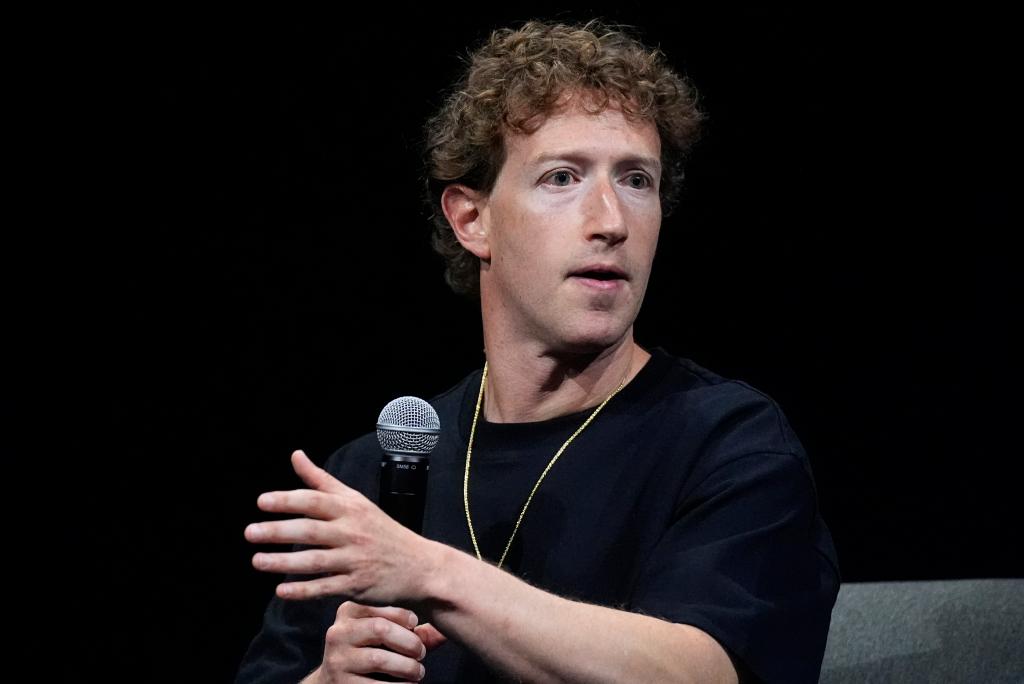“Tech Titans and Royal Rebukes: The Unlikely Feud That’s Got Everyone Talking
In a shocking turn of events, the Duke and Duchess of Sussex, Prince Harry and Meghan Markle, have taken aim at none other than Mark Zuckerberg, the CEO of Meta, over a major change to the platform’s fact-checking policies. The unexpected broadside has left many wondering what sparked this royal rebuke, and what it might mean for the future of online discourse.

Meta’s Fact-Checking Change and Its Implications
The Decision: Meta’s Shift in Priorities

Mark Zuckerberg’s recent announcement on Meta’s policy change has sent shockwaves across the digital landscape. According to the Facebook tycoon, Meta will be scrapping fact-checking and restrictions on free speech, citing the need to return to the platform’s original focus on free speech. This decision marks a significant shift in Meta’s priorities, with the company seemingly abandoning its previous commitment to protecting users from misinformation and online harm.
This move has been met with widespread criticism, with many experts and advocates expressing concerns about the potential consequences of this policy change. Prince Harry and Meghan Markle, who have been vocal about the importance of online safety and accountability, recently slammed Meta for “contributing to a global mental health crisis” through this decision.

Zuckerberg’s Announcement: Return to Original Focus on Free Speech
Meta’s decision to scrap fact-checking and restrictions on free speech is seen by many as a response to growing pressure from politicians and free speech advocates. Zuckerberg’s announcement has been interpreted as an attempt to appease these groups and restore the platform’s original focus on free speech. However, this move has also raised concerns about the potential consequences for online safety and the spread of misinformation.
According to Zuckerberg, Meta’s decision to return to its original focus on free speech is necessary to promote a more open and inclusive online environment. However, many experts argue that this approach will ultimately lead to the normalization of hate speech and abuse, undermining the very principles of free speech that Meta claims to uphold.
Scrapping Fact-Checking and Restrictions on Free Speech
Meta’s decision to scrap fact-checking and restrictions on free speech has significant implications for the online community. Without these measures in place, users will be more vulnerable to misinformation and online harm. This is particularly concerning for marginalized communities, who are often the most vulnerable to online abuse and harassment.
Furthermore, the removal of fact-checking and restrictions on free speech will make it more difficult for users to distinguish between credible and unreliable sources of information. This will ultimately contribute to the spread of misinformation and undermine trust in online platforms.
Prince Harry and Meghan Markle’s Response
Condemning Meta’s Decision: Contributing to Global Mental Health Crisis
Prince Harry and Meghan Markle were quick to respond to Meta’s policy change, condemning the decision as “contributing to a global mental health crisis.” The couple, who have been vocal about the importance of online safety and accountability, expressed concerns about the potential consequences of this policy change.
According to the Duke and Duchess of Sussex, Meta’s decision will ultimately lead to the normalization of hate speech and abuse, undermining the very principles of free speech that the platform claims to uphold. They argue that this approach will serve to silence marginalized communities and threaten the voices of whole communities who make up a healthy democracy.
Normalizing Hate Speech and Abuse: Threat to Healthy Democracy
Prince Harry and Meghan Markle’s concerns about the normalization of hate speech and abuse are not unfounded. Research has consistently shown that online harassment and abuse can have serious consequences for mental health and well-being. By failing to address these issues, Meta is ultimately contributing to a toxic online environment that undermines the principles of free speech and healthy democracy.
The couple’s statement also highlights the importance of accountability and safeguarding information integrity in the digital age. They argue that Meta’s decision to scrap fact-checking and restrictions on free speech is a clear example of the company’s disregard for these principles, prioritizing profit over public safety and integrity.
The Risks and Consequences of Meta’s New Policy
Fostering an Environment of Abuse and Hate Speech
Meta’s decision to scrap fact-checking and restrictions on free speech has significant implications for the online community. Without these measures in place, users will be more vulnerable to online abuse and harassment. This is particularly concerning for marginalized communities, who are often the most vulnerable to online harm.
Furthermore, the removal of fact-checking and restrictions on free speech will make it more difficult for users to distinguish between credible and unreliable sources of information. This will ultimately contribute to the spread of misinformation and undermine trust in online platforms.
Silencing Marginalized Communities and Threatening Democracy
Meta’s decision to scrap fact-checking and restrictions on free speech has significant implications for marginalized communities. Without these measures in place, these communities will be more vulnerable to online abuse and harassment, ultimately silencing their voices and undermining their participation in online discourse.
This is particularly concerning, as marginalized communities are often the most vulnerable to online harm. By failing to address these issues, Meta is ultimately contributing to a toxic online environment that undermines the principles of free speech and healthy democracy.
Ignoring Expert Warnings on Online Harm and Children’s Safety
Meta’s decision to scrap fact-checking and restrictions on free speech has been met with widespread criticism from experts and advocates. Many have warned about the potential consequences of this policy change, highlighting the importance of online safety and accountability in the digital age.
Furthermore, research has consistently shown that online harassment and abuse can have serious consequences for mental health and well-being, particularly for children and young people. By failing to address these issues, Meta is ultimately ignoring expert warnings and contributing to a toxic online environment that undermines the principles of free speech and healthy democracy.
The Impact on Online Communities and Users
The Effects on Mental Health and Well-being
Meta’s decision to scrap fact-checking and restrictions on free speech has significant implications for online communities and users. Without these measures in place, users will be more vulnerable to online abuse and harassment, ultimately contributing to a toxic online environment that undermines mental health and well-being.
Furthermore, the removal of fact-checking and restrictions on free speech will make it more difficult for users to distinguish between credible and unreliable sources of information. This will ultimately contribute to the spread of misinformation and undermine trust in online platforms.
Normalizing Hate Speech and Abuse: Long-Term Consequences
Meta’s decision to scrap fact-checking and restrictions on free speech has significant implications for online communities and users. Without these measures in place, hate speech and abuse will become normalized, ultimately contributing to a toxic online environment that undermines mental health and well-being.
This is particularly concerning, as research has consistently shown that online harassment and abuse can have serious consequences for mental health and well-being. By failing to address these issues, Meta is ultimately contributing to a toxic online environment that undermines the principles of free speech and healthy democracy.
The Need for Accountability and Safeguarding Information Integrity
Meta’s decision to scrap fact-checking and restrictions on free speech highlights the importance of accountability and safeguarding information integrity in the digital age. The company’s decision to prioritize profit over public safety and integrity is a clear example of its disregard for these principles.
Furthermore, the removal of fact-checking and restrictions on free speech will make it more difficult for users to distinguish between credible and unreliable sources of information. This will ultimately contribute to the spread of misinformation and undermine trust in online platforms.
The Call to Action and Future Directions
Reconsidering and Reinstating Policies to Protect Users
Meta’s decision to scrap fact-checking and restrictions on free speech has significant implications for online communities and users. In light of these concerns, it is essential that the company reconsider and reinstate policies to protect users from online abuse and harassment.
This includes reinstating fact-checking and restrictions on free speech, as well as implementing measures to address online harm and promote online safety. By taking these steps, Meta can help to create a safer and more inclusive online environment that promotes healthy democracy and free speech.
The Role of Leaders in Upholding Commitments to Integrity and Public Safety
Meta’s decision to scrap fact-checking and restrictions on free speech highlights the importance of leadership in upholding commitments to integrity and public safety. By prioritizing profit over public safety and integrity, the company is ultimately contributing to a toxic online environment that undermines the principles of free speech and healthy democracy.
Leaders must take a proactive role in promoting online safety and accountability, ensuring that online platforms prioritize public safety and integrity over profit. This includes implementing measures to address online harm and promoting online safety, as well as holding companies accountable for their actions.
The Need for Collective Action to Promote Online Safety and Responsibility
Meta’s decision to scrap fact-checking and restrictions on free speech highlights the importance of collective action in promoting online safety and responsibility. By working together, we can create a safer and more inclusive online environment that promotes healthy democracy and free speech.
This includes governments, companies, and individuals working together to address online harm and promote online safety, as well as holding companies accountable for their actions. By taking a proactive and collective approach, we can help to create a better online environment for all.
Conclusion
In conclusion, the recent criticism from Prince Harry and Meghan Markle towards Mark Zuckerberg over Meta’s fact-checking change has sparked a significant debate about the role of social media platforms in regulating misinformation. The key points of contention revolve around Meta’s decision to allow political candidates to run ads without fact-checking, a move that the Duke and Duchess of Sussex argue will perpetuate the spread of false information and undermine trust in institutions. The main arguments presented highlight the tension between free speech and the need for accountability, with Prince Harry and Meghan Markle emphasizing the importance of responsible leadership in the tech industry.
The significance of this topic cannot be overstated, as it has far-reaching implications for the future of online discourse and the dissemination of information. The fact that high-profile figures like Prince Harry and Meghan Markle are speaking out against Meta’s policy change underscores the gravity of the issue and the need for greater scrutiny of social media platforms. As we move forward, it is likely that we will see increased calls for regulation and accountability in the tech industry, particularly in the lead-up to major elections. The future implications of this debate will be closely watched, as it has the potential to shape the very fabric of our online interactions and the way we consume information.
As we consider the potential consequences of Meta’s fact-checking change, one thing is clear: the stakes are high, and the need for responsible leadership has never been more pressing. In an era where misinformation can spread like wildfire, it is imperative that social media platforms prioritize fact-based discourse and take concrete steps to prevent the spread of falsehoods. As Prince Harry and Meghan Markle’s criticism of Mark Zuckerberg serves as a catalyst for this important conversation, we are reminded that the power to shape our online landscape lies not just with tech giants, but with all of us. Ultimately, the question remains: will we prioritize truth and accountability, or will we allow the forces of misinformation to continue to erode our trust in institutions and in each other? The answer will have a profound impact on the future of our society, and it is up to us to demand better.
